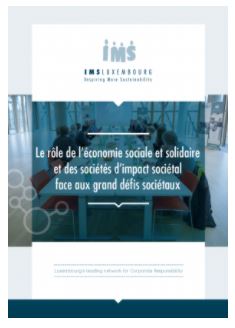Eight Societal Challenges in Luxembourg
The new borders of private sector

Luxembourg is no exception and is facing many societal issues. Some social and solidarity economy organisations are already trying to provide solutions. Still, the force of a traditional company deploying a "social business" approach would allow the transition to another scale and address issues that are sometimes insufficiently invested. IMS Luxembourg with the support of the Ministry of Labour, Employment and Social and Solidarity Economy, publishes a study to identify national opportunities by challenges. Diagnosis of areas where companies could make a difference and where inspiring initiatives are already successfully breaking through.
1. Adapting society to ageing
By 2060, the majority of Luxembourg's population is expected to age, and inhabitants over 65 years old will account for more than 26 % of the total population.
Mamie et Moi collaborates with senior women of the Greater Region, which allows them to remain active through a pleasant, socialising occupation that enhances them: knitting.
2. Achieving the inclusion of disabled people in society
Some 10% of the available jobseekers registered at the Agency for the Development of Employment (ADEM) in 2016 were people with disabilities.
The Info-media workshop, led by Autisme Luxembourg, trains people with autism and employ them in the field of new ICT applied to digital media.
3. Enabling the professional and social integration of migrants and refugees
In 2018, the Immigration Branch registered 2,205 claims for refugee protection. Integrating new migrants and improving their living conditions is a real challenge for the country.
Passerell assists asylum seekers and refugees in defending their rights. In a complementary way, Touchpoints creates meeting points between local and immigrant populations in Luxembourg through several concrete projects.
4. Making housing accessible
There is a real gap between the demand for housing (between 6,000 and 8,000/year) and the number of new constructions (between 2,500 and 4,000) per year in Luxembourg. According to Eurostat, Luxembourg is the country with the 3rd highest increase in housing prices in Europe (+11.3%).
The association Cohabit'âge develops intergenerational households, and the Ad Hoc group brings together people enthusiastic about the idea of living together to create supportive and inclusive neighborhoods.
5. Supporting changes in a digital economy
According to the OECD, 14% of jobs could be automated, and 32% could change significantly over the next 15 to 20 years. "80,000 jobs can be created in Luxembourg by 2020 with the digitalisation of the economy", said Thierry Geerts, director of Google Belgium-Luxembourg in 2017.
Women in Digital Empowerment aims to empower women through digital technology, and to increase the number of women seizing opportunities in the digital economy and society.
6. Training to support economic growth
According to the OECD, in 2019, 79% of CEOs are concerned about a lack of key skills. In the context of an aging population and a shortage of labor, training is a real challenge for Luxembourg.
Defi-job acts by promoting the socio-professional reintegration of people in prison in the hope that regular employment can reduce the risk of recidivism while taking into account the profile of prisoners and the specificities of the labor market.
7. Fighting food waste, producing better and more locally
124 kilos of food per person are thrown away every year in Luxembourg.
The Changeons de Menu initiative, initiated by the NGO SOS Faim in June 2015 seeks to raise awareness about responsible food via a website and a food footprint calculator.
8. Implement better waste management
84% of waste in Luxembourg comes from construction, compared to only 30% in Europe. Therefore, each inhabitant in Luxembourg throws away an average of 52 kg of plastic waste per year.
NEI AARBECHT collects objects from all over the country that the inhabitants no longer need and are willing to give up.
Find the complete study in free access.
This study was co-constructed during a working session involving the Ministry, ULESS and CEOs from companies member of IMS. The participants exchanged views on these challenges and opportunities, with the contribution of Patrice Partula and Jean Bernou, experts in social innovation.
To be read also in the dossier "Social Business":




